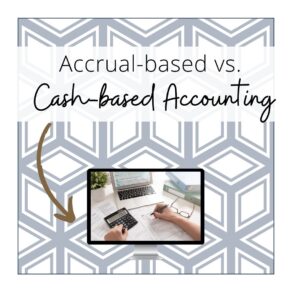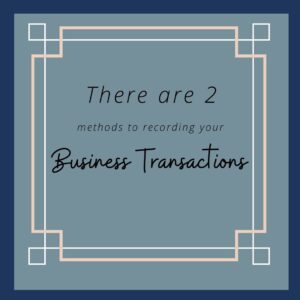
Before we start, Accountants (like me) often use terms that are assumed to be understood by the general public. Yes, it’s obnoxious, confusing, and deteriorating to communication and learning. To avoid you Googling the nerdy terms in this article here’s a great resource for all my favorite accounting jargon. Today, I’ll break down Accrual-based versus Cash-based Accounting.
As a business owner, you do not need to be proficient in all things business, you have to be resourceful. It’s highly recommended that all business owners have a trusted and reliable advisory board. One board member – Finance. You don’t need a full-time CFO, VP, Controller, Director, or whatever you want to call it, you can have a consulting board for advice and on-going support; see our CFO Hourly Services. For more information on the value of an advisory board see Entrepreneure.com Advisory Boards. Now back to the topic at hand, let’s begin!

Let’s talk accounting options
There are two methods to recording your business transactions: accrual-based and cash-based. The two systems are very different and will change the way you manage your cash flow, income statement, report taxes, and how your accountant will record your finances. To best explain the differences of Accrual-based versus Cash-based Accounting, I’m going to start with a simple scenario.
On May 20th you had a job worth $10,000 of income. Your client pays you in full on May 25th. To complete the job, you purchased $2,000 worth of supplies (drum brakes, yoga mats, canvas, whatever it may be). The vendor you used is set up on Net 30 terms. You ordered the supplies on May 5th and will pay the vendor June 5th. In June, you have one job worth $7,000 with no needed supplies. Your June client pays July 1st. You are closed for the month of July with no income or expenses.
Accrual-based accounting
Accrual-based accounting is when you record business transactions when they occur. You will align your income and expenses from a single period and have visibility on how related business transactions result in a profit or loss. For example, with accrual-based accounting, you will report your $10,000 of income regardless of when your client pays you. Equally you will report the $2,000 expense you incurred even though you don’t pay the bill until the following month.
When you record your business transactions in the fiscal period they occur, your income statement will show earned revenue with incurred expenses for that period. As long as your Chart of Accounts is properly detailed, this method of accounting will give you visibility on how and why your business reported a profit or loss. Having this level of visibility is fundamental to making sound business decisions BUT knowing the health of your cash flow is also essential. When you use Accrual-based versus Cash-based Accounting, managing a cash flow analysis is more cumbersome because you will need to forecast for your account’s payables and receivables.
Cash-based accounting
When we look at cash-based accounting your business transactions are reported as cash is exchanged. Cash-based accounting is typical with smaller businesses that will likely make business decisions based on their bank balance.
When using cash-based accounting, your income statement will appear volatile, and you won’t have the needed information to make forward-looking business decisions based on your financials. With that said, cash-based accounting is a simple bookkeeping process and provides real-time, predictable cashflow.
Applying the same example from above, you will record the $10,000 of income because you received payment in May, not because you did the work in May. As for the $2,000 expense, you will pay this on June 5th. This means you will not record the $2K expense in May. For this reason, your income statement will show the $10,0000 income without the related $2K expense. When you use cash-based accounting, you record your business transactions only after cash is exchanged.
Callouts for concern with cash-based accounting
Having a keen eye on your labor expense is detrimental to your success. How do you compare productivity between May and June if your net income does not report with payroll? When we talk about labor expense, we need to understand the profit or loss generated by our workforce. This level of visibility allows a business owner to understand if there are opportunities to add on more labor to generate income or identify inefficiencies and labor savings. Cash-based accounting does not allow for this level of analysis.
To help you see the overall difference between the two methods, below you will find the May-July abbreviated income statements. For more information on the scrutiny of labor cost management see the Small Business Chronical or call us, we can assist with our Time and Money services.[/vc_column_text]
| Accrual-Based Accounting | Cash-Based Accounting | |||
|---|---|---|---|---|
| May | May | |||
| Revenue | 10,000 | Revenue | 10,000 | |
| Payroll | 1,500 | Payroll | 1,500 | |
| Expense | 2,000 | Expense | 0 | |
| Net Operating Income | 6,500 Profit | Net Operating Income | 8,500 Profit | |
| June | June | |||
| Revenue | 7,000 | Revenue | 0 | |
| Payroll | 1,000 | Payroll | 1,000 | |
| Expense | 0 | Expense | 2,000 | |
| Net Operating Income | 6,000 Profit | Net Operating Income | (3,000) loss | |
| July – Closed | July – Closed | |||
| Revenue | 0 | Revenue | 7,000 | |
| Payroll | 0 | Payroll | 0 | |
| Expense | 0 | Expense | 0 | |
| Net Operating Income | 0 | Net Operating Income | 7,000 | |
| NOI Summary by Month | NOI Summary by Month | |||
| May | 6,500 | May | 8,500 | |
| June | 6,000 | June | (3,000) | |
| July | 0 | July | 7,000 | |
| Total 3 months | 12,500 | Total 3 months | 12,500 |
Tax Implications
Another important detail is tax reporting, specifically as you change years or quarters, (depending on what frequency you remit). The period you record your revenue is when you will report your earnings to pay taxes. In this case, according to Entrepreneure.com, cash-based accounting can be advantageous. By recording your transactions when you receive cash, theoretically, you will have money in the bank to pay the taxes. With accrual-based accounting you may have to pay taxes on the income you have not received; this relies on a positive cashflow.

Why would someone use cash-based accounting?
Business size and cash flow are the two factors of why a company would opt for cash-based accounting. When operating a business that relies on cash balances to make decisions, cash-based accounting may be the most logical. It’s also a very simple way of bookkeeping.
With today’s Covid19, many businesses have shifted their view to a more cash-based practice. Because the business environment has dramatically slowed or completely stopped the cash conversion cycle has changed. During abnormal times like these, Deloitte recommends an immediate response to shifting from the income statement to the balance sheet and understanding your cash on hand and liquidity. Trying times become cash focused, especially when your income statement isn’t providing much substance. Check out their article for a number of ways to manage cash flow during a crisis.
To accrue or not to accrue??
It’s important that you review your business and which accounting method is most logical for managing your books. If you’re not an accountant I recommend discussing these two options with your accountant or consulting with someone familiar with bookkeeping and finance. As the owner, you need to be a part of the conversations, and have the final say on Accrual-based versus Cash-based Accounting. The way you operate your business and the accounting reports you receive will drastically differ based on the decided method.
To facilitate you with your decision, here’s the skinny
| Accrual-Based Accounting | Cash-Based Accounting |
| Record revenue and expense in the period they occur | Record revenue and expense in the period cash is exchanged |
| Income statement shows how your revenue and expenses align against each other | Income statement may include revenue or expenses from previous periods and be unrelated |
| Supports business forecast | Little ability to plan for the future |
| Cashflow analysis is forecasted | Cashflow is simplistic, in real time |
| Required by GAAP | Not acceptable by GAAP |
So, Accrual-based versus Cash-based Accounting? You decide and we can help with the books to support your decision!







